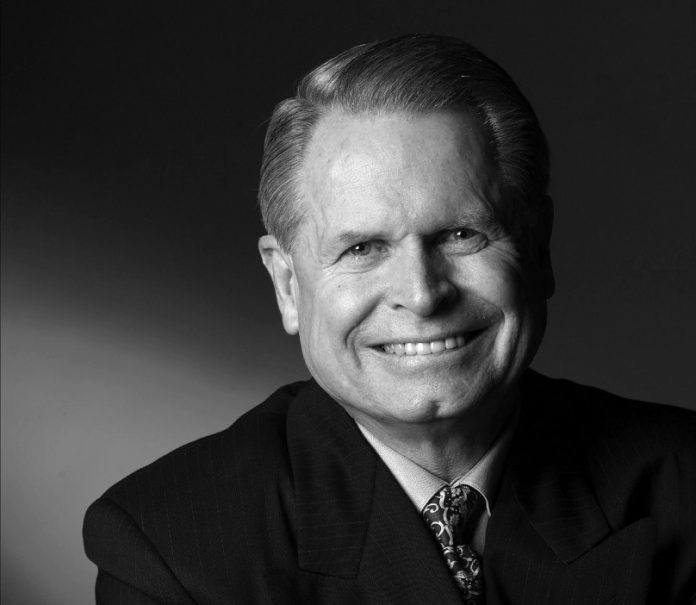Ray Zinn is the “longest serving CEO of a publicly traded company in Silicon Valley.”
Moreover, Ray Zinn is also a man of many talents: he is an “inventor, entrepreneur, investor, angel,” and “bestselling author.”
Likewise, Ray Zinn also founded the “nationally launched ZinnStarter program at colleges around the country.” The program provides “financial and mentoring support for students to launch new products and companies.”
In 2015, Ray Zinn also published his first book, with McGraw Hill, titled “Tough Things First.”
In the book, Ray Zinn writes about working for “nearly 40 years” at the head of Micrel. The company is a “Silicon Valley institution.”
Ray Zinn also discusses the “critical factors that entrepreneurs and seasoned executives alike need to know, including the intricacies of nurturing corporate culture.”
Aside from being a CEO, Ray Zinn is also famous for “conceptualizing and in effect inventing the Wafer Stepper, and for cofounding the semiconductor company Micrel.”
Micrel, which was acquired by Microchip in 2015, “provides essential components for smartphones, consumer electronics and enterprise networks.” Ray Zinn has served as CEO, Chairman of the Board of Directors, and President since its founding in 1978.
Ray Zinn also holds more than 20 patents “for semiconductor design.” He has been cited in several books, “including Jim Fixx’s The Complete Book of Running and Essentialism by Greg McKeown.”
Check out more interviews with inventor executives here.
I created a culture that would consistently think outside the box when it came to customer support and creating new business. Ray Zinn, Micrel
Jerome Knyszewski: Thank you so much for joining us in this interview series! Before we dive in, our readers would love to “get to know you” a bit better. Can you tell us a bit about your ‘backstory’ and how you got started?
Ray Zinn: I started out very typically in Silicon Valley, working for a variety of semiconductor companies and making a good living but as with many entrepreneurs, I felt something was missing.
Jerome Knyszewski: What was the “Aha Moment” that led to the idea for your current company? Can you share that story with us?
Ray Zinn: Of course. I was working for a company where my boss made it clear that getting Texas Instruments as a customer was going to be crucial to my continued employment.
As a sales guy, the competition for a smaller company such as the one I worked for meant I knew I had to get creative.
So, I devised a way to get them on board by conceiving of a product that is now standard to silicon chips.
I did this without specs or engineering plans or even telling the development team because I figured that the cost I was going to quote them would put them off but it would still get our foot in the door by showing TI we had compelling long term product plans.
Well, my plan worked, too well it seemed, because TI promptly accepted my very high quote, price and all, which meant my company had to not only accept the PO but start designing the machine I had envisioned.
I was very nervous, because I never expected them to accept my quote. I was just trying to get my foot in the door.
All this sounds great but we were a smaller company so resources would need to be diverted from another project which another customer, IBM, was pretty steamed about.
The end result was that my creative approach to new customer cultivation ruffled way too many feathers and my boss invited me to, as the saying goes, “pursue other opportunities”.
What was genuinely helpful about this is that in the process, he made the observation that I was not made to work for someone else, that I really need to run my own show.
This was really my ‘ah ha’ moment where I realized I wanted to create and run my own company.
Micrel was the eventual result and in the process I created a culture that would consistently think outside the box when it came to customer support and creating new business.
Jerome Knyszewski: Can you tell us a story about the hard times that you faced when you first started your journey? Did you ever consider giving up? Where did you get the drive to continue even though things were so hard?
Ray Zinn: Getting funding was a real challenge when I first started my journey.
I knew that I did not want to go the Venture Capital route, that I wanted control of day-to-day operations which I also knew would not be possible with VC funding so I explored a variety of other options and eventually was able to secure a loan from a bank.
This sounds great but in Silicon Valley, banks do not, even today, lend money to what they view as risky startups, that is the purview of Venture Capitalists.
So, as part of securing that funding, the bank came up with really challenging stipulations as part of the loan.
The most daunting was that Micrel had to be profitable from the very first quarter. Who knows of a startup that was profitable right out of the gate?
Sounds impossible but we made it happen.
I was always a determined sort but because I’d personally guaranteed the loan, my view was that failure was not an option.
Micrel would go on to build a culture built on making cash king and frugality and, as a result, we were profitable 36 out of 37 years.
For the entire 37 years of Micrel’s existence, we made cash king.
Jerome Knyszewski: So, how are things going today? How did your grit and resilience lead to your eventual success?
Ray Zinn: Micrel was sold a few years ago but we thrived for 37 years, a record of sorts. Because I lost my sight during our IPO, I had to be more resilient than most.
I had to learn how to navigate the world sightless while convincing a skeptical BOD that I could run a multi-national company without the benefit of my sight.
This determination kept Micrel going, we had a culture based on never giving up, always doing whatever it took to succeed.
Jerome Knyszewski: Can you share a story about the funniest mistake you made when you were first starting? Can you tell us what lessons or ‘takeaways’ you learned from that?
Ray Zinn: Well. it was not my mistake per say but it was a legendary story at Micrel so I will share this tale.
We had created a culture that did not allow swearing.
Cursing was seen as disrespectful and even demeaning so everyone avoided swearing except one beloved executive whom I had recruited from within the industry for both his talent and drive.
He was a great fit for our culture save for his need to express himself using rough language.
This put me in a tough position because I knew he would make amazing contributions to the company’s success.
Thus, I also needed to find a way to help him curb his swearing.
At this point, I could not recall a single conversation with him that did not contain colorful words and he appeared immune to threats.
However, given that we had known each other a very long time, I also knew he was not immune to a challenge so I got creative.
I told him from then on out he would need to put a dollar in the swear jar every time I caught him using curse words and that the funds would go toward staff party expenses. Never one to back down from a challenge, he took the bait.
Within a week he started holding on to one dollar bills when the lunch cashier handed him change and daily I headed home with a few extra dollars for our party fund.
It got to the point that he was asking the bank for singles which would was funny to everyone witnessing the daily transactions but fast becoming a major annoyance to the executive who had made the deal with me.
It all came to head in one meeting when he absentmindedly let slip a vulgarity and then another and another.
The room fell silent while he shoved a hand in his pocket and shoved a fist full of dollars at me for current and future expenses.
For whatever reason, that seemed to be the turning point. By the time he retired from Micrel, his swearing had all but ceased but the story was one we all enjoyed reliving.
As a result of having built a culture that valued everyone and was based on respect, nobody wanted to leave! Ray Zinn
Jerome Knyszewski: Ok super. Here is the main question of our interview. What are your “5 Things I Wish Someone Told Me Before I Began Leading My Company”? Please share a story or an example for each.
Ray Zinn: Funding. I never knew how tough getting funding was going to be until I tried to, of course, obtain startup funding.
This is why so many entrepreneurs go the VC route only to regret it later because once you chose VC funding they basically own you.
Micrel was never beholden to Venture Capitalists because we did not choose this route which turned out to be one of the best decisions I never made.
Watching other companies and startups struggle under the yoke and relentless expectations of investors made that clearer every year we were in business.
Frugality. I knew financial discipline would be important but until I fully understood the cyclical nature of semiconductors, I never knew just how important maintaining a frugal culture would be.
Micrel’s lean and mean way of running of the company was the very reason we were able to endure eight major economic downturns.
Even as we were reaping the benefits of an upswing in business, we were always planning for the next, inevitable downturn.
For the entire 37 years of Micrel’s existence, we made cash king.
Slow your roll. Companies, particularly in high tech, seem to be in an awful hurry to grow and the more rapidly the better which is the opposite of what they should be doing.
I learned from running my own company that organic growth was far better for the company in the long run.
I never wanted to staff up artificially during an upswing only to have to lay off droves of loyal employees when the next inevitable downturn came.
And I saw this over and over in the chip business. Slower, more organic growth therefore ended up making the most sense.
Culture. I never knew how important this would be until I created a culture based on respect for all individuals regardless of title or job.
I knew it would be critical to building the kind of company I envisioned but the secondary benefits came as somewhat of a surprise.
As a result of having built a culture that valued everyone and was based on respect, nobody wanted to leave!
We had one of the lowest attrition rates in Silicon Valley and one of the highest boomerang rates for the few who did leave.
This had economic benefits as well.
We were able to retain very valuable and sought after talent and our culture allowed people to grow and flourish which certainly benefitted the company and its employees enormously.
BOD woes. Before I ran my own company, I never knew just how much the different stages of a company would be impacted by the BOD.
In a company’s early years, adequate board members are reasonably easy to come by and relatively inexpensive.
However, as a company grows so do the stakes and a CEO needs to acquire board members with more discipline, better track records and keener insights.
This becomes increasingly difficult as time goes by.
Jerome Knyszewski: How can our readers further follow you online?
Ray Zinn: Follow me on these channels:
You can also learn more about my book here.
Jerome Knyszewski: This was very inspiring. Thank you so much for the time you spent with this!





